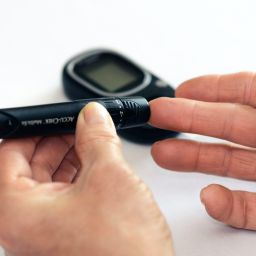 Diabetes occurs when the body cannot regulate its blood sugar (glucose levels) properly. This leads to an elevated level of sugar in the blood which can cause complications such as heart disease, strokes, kidney issues, nerve damage, and eye problems. According to Diabetes.co.uk, rates of diabetes in the UK have skyrocketed since the 1990s with somewhere between 3.9 million and 4.8 million people affected.
Diabetes occurs when the body cannot regulate its blood sugar (glucose levels) properly. This leads to an elevated level of sugar in the blood which can cause complications such as heart disease, strokes, kidney issues, nerve damage, and eye problems. According to Diabetes.co.uk, rates of diabetes in the UK have skyrocketed since the 1990s with somewhere between 3.9 million and 4.8 million people affected.
Most people have Type II diabetes, which is beginning to be treated as a lifestyle condition. While many people with type II diabetes are overweight, the science is currently unclear whether obesity causes the diabetes, or whether uncontrolled blood sugar damages the metabolism and causes the excess weight. What is clear is that rates of this illness are rising rapidly and it would be wise of all of us to pay attention to the risk factors and attempt to keep ourselves healthy.
In 2017 the National Council for Hypnotherapy (NCH) reported that the NHS was under ‘enormous and unsustainable strain’ from a condition that already costs it £5bn a year to treat.
Of course, like many different issues, just because we know the logic of how to keep ourselves healthy doesn’t mean that we are actually able to consistently take the steps needed to protect our long term health. Hypnotherapy can be an extremely effective intervention for changing behaviours and helping support people make healthy choices for themselves.
A study published by the US National Library of Medicine National Institutes of Health in 2017 investigated hypnotherapy for diabetes management. The authors of the study noted that “…hypnotic suggestions may indeed serve as a motivational coach and may be used effectively to alter beliefs and behaviours and hence serve as an ancillary method in the management of diabetes.”
This builds upon previous research that had established that hypnotherapy was an effective tool for stress management which resulted in lowering blood glucose levels. Not only did the subjects blood sugar levels decrease, they reported feeling calmer and more relaxed which meant that they had greater internal resources to tackle lifestyle changes such as dietary adjustments and committing to exercise plans.
Many people report that losing weight improves their Type II diabetes symptoms, meaning people can take fewer medications and have better long-term health outcomes. Exercise is crucially important for the management of blood sugar. Even 20 minutes of moderate exercise like walking has been shown to significantly improve blood sugar responsiveness. However, for some people the effort required to form a consistent exercise routine is too difficult and they falter.
Diet also plays an important role in both weightloss and diabetes management. The NCH writes that “rather than just reducing calories that you are likely to put on again in the longer term, hypnosis gets you in touch with the reasons why you unconsciously eat. If you are the type of person that struggles to stop after a small piece of chocolate and feels compelled to finish the packet then a hypnotherapist can help you understand why and help you create new healthy self-management techniques.”
This is backed up by the 2017 study which found that “the increased suggestibility shown during the hypnotic state would be helpful in increasing compliance for exercise, diet, and other lifestyle changes required for diabetes management, including stress reduction that is associated with the better metabolic control.”
The growing body is scientific literature which examines the role of blood sugar for driving cravings and food choices makes it clear that this is a multifaceted issue and not something that is easily solved by willpower alone. If you’re struggling to manage your diabetes you can find a hypnotherapist near you by using the NCH’s directory.










